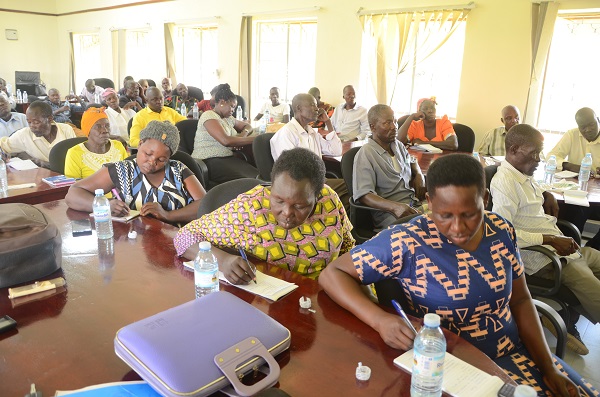SOROTI-The Ministry of Water and Environment has urged farmers that were evicted from wetlands recently to embrace climate smart agriculture [CSA].
According to World Bank, CSA is an integrated approach to managing landscapes—cropland, livestock, forests, and fisheries that address the interlinked challenges of food security and climate change.
The call from the Ministry comes as government continues to evict people from wetlands in the country in order to restore the ecosystem.
While addressing water and environment cooperatives leaders in Teso Sub-region, during training on governance and management, Emmanuel Smith Enwaku, the social development expert in the Water and Environment Ministry said those evicted from the wetlands need to embrace agroforestry in order to achieve sustainable land use.
The two days training held at National Semi Arid Resources Research Institute [NASARRI] this week, brought together the leaders of Kyere Water and Environment Cooperative Society in Serere district, Ngora Water and Environment Cooperative Society in Ngora district and Kapujan Water and Environment Cooperative Society.
It was organised by the Ministry of Water and Environment in partnership with the Ministry of Trade, Industry and Cooperatives [MTIC] under the project, ‘Enhancing Resilience of Communities to Climate Change through Catchment Based Integrated Management of Water and Related Resources in Uganda’ or EURECCA Project.
“The project funded by Adaptation Fund through Sahara and Sahel Observatory [OSS] is being implemented in three catchments of Awoja found in Kyoga Water Management Zone, Aswa found in Upper Nile Water Management Zone and Maziba found in Victoria Water Management Zone,” said Enwaku.
He pointed out that the project among others supports government’s efforts to implement and promote Integrated Water and Resources Management [IWRM].
According to Enwaku, the overall objective of the project is to increase the resilience of communities to the risk of floods and landslides.
“The wetlands under Awoja catchment area have been degraded by human activities, like poor Agricultural practices, leading to soils eroded down into the river,” said Enwaku.
Enwaku added that through EURECCA project, over 1,500 wetland evictees were helped to form cooperative societies through which the Ministry of Water and Environment would financially support them to start alternative livelihoods like; pig and goat rearing among others.
He noted that the Ministry of Water and Environment has partnered with MTIC to train SACCO leaders in enterprise selection, governance, management, and financial literacy skill.
Henry Tito Okwalinga, the chairperson of Kyere Water and Environment Saving and Credit Cooperative Society, formed by members affected by wetland restoration programme, welcomed the move and vowed never to encroach on the wetland again, pledging to sensitise other people about the restoration of wetlands.
Angella Akol, a member of Kapujan Water and Environment Saving and Credit Cooperative Society in Katakwi district was optimistic that the EURECCA project would change their lives.
“We were worried that their livelihoods would be affected following their eviction from wetlands under wetland restoration programme but with the coming of EURECCA project we shall be able to start other alternative livelihood projects,” she said.
Meanwhile, Moses Irwamaut, the LCIII chairperson Kapujan Sub-county, urged government to also consider other people like brick makers who operate in wetlands, saying that their activities contribute to wetland degradation.
According to the Auditor General’s report 2018, wetlands declined from about 13 percent in 1994 to 8.9 percent in 2017, which has led to the occurrences of negative consequences such as floods, prolonged dry seasons, loss of biodiversity, and deteriorating water quality.
https://thecooperator.news/over-900-hectares-of-wetlands-in-kwania-under-attack/
Buy your copy of thecooperator magazine from one of our country-wide vending points or an e-copy on emag.thecooperator.news
